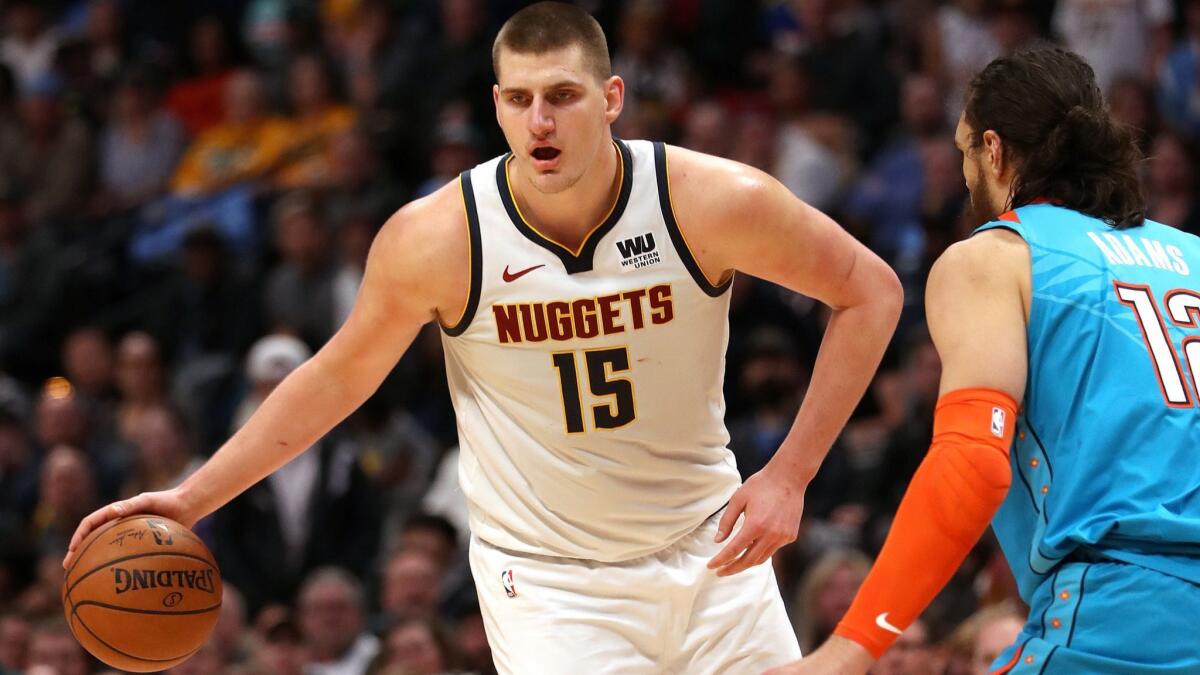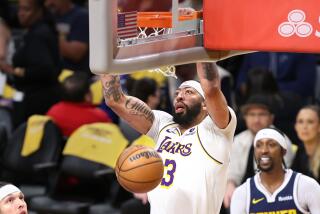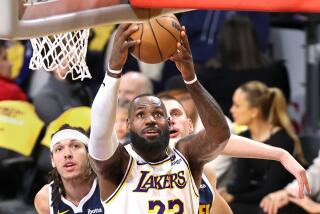Nikola Jokic and the Nuggets have slowly established themselves as contenders

Reporting from Denver — Nikola Jokic isn’t in a hurry to get somewhere.
That he was one of the last people out of the Denver Nuggets’ locker room after a game last week shouldn’t be a surprise. After competing in the NBA’s All-Star weekend skills challenge, Denver’s 7-foot, 250-pound center said the toughest part of the contest was “the running.”
It’s not uncommon to see him lumber down the court seemingly under duress only to splash home a three-point shot. Or to see him grab rebounds with one hand and fire passes around the floor like he’s shooting them out of a cannon.
On this day, it’s not uncommon to see Jokic pause a second or two before answering questions with a hint of playful sarcasm in his answers.
About the Toronto Raptors’ Danny Green calling him an “octopus” because of his long arms: (Pause) “I like it.”
About that play in the All-Star game when he passed the ball to LeBron James while James was standing out of bounds to cause a turnover: (Pause) “I liked that play too.”
When he wants to dispense with the jokes, Jokic will use the phrase “for real,” and in discussing Denver’s success, he turns serious. The Nuggets, like every team whose depth is a strength, have a potential issue looming. For real.
“There’s always going to be some guys not satisfied with the minutes or how they’re playing or what their role is. That’s normal. We have that the last four years,” Jokic said. “Every team has that. We just need to keep everybody comfortable and keep everybody happy.”
Sign up for our daily sports newsletter »
Right now, despite a rare home loss to New Orleans on Saturday, everyone in Denver is happy.
The Nuggets are winning — they’re tied for the NBA’s second-best home-court record at 27-6 — and they’re fighting with the Golden State Warriors for the top spot in the Western Conference, both teams comfortably ahead of the pack chasing them. With the exception of first-round pick Michael Porter Jr., Denver finally is nearing full health for the first time this season.
Guard Isaiah Thomas has returned from a hip injury that cost him three quarters of the season. Gary Harris, Denver’s starting shooting guard, is back after dealing with a variety of lower body injuries and then coming off the bench.
Starters Will Barton and Paul Millsap also missed time, but a number of players stepped up while Denver dealt with injuries. Nine players have started at least 15 games for the Nuggets, more than every team in playoff position entering play Saturday except for Brooklyn, which also had nine players start at least 15.
Players such as Malik Beasley, Torrey Craig and Juan Hernangomez have been key contributors throughout the season — but only Beasley seems like a lock to keep getting big minutes as the team gets whole.
It’s a sign that Denver’s been beaten up this season. It’s also a sign that the Nuggets have incredible depth because the injuries haven’t precluded them from racking up wins. It’s because the team has so many “NBA players,” as forward Mason Plumlee calls them — a moniker used by players to describe others who can contribute to winning.
Denver, Plumlee said, is a team full of NBA players.
“It’s definitely an issue more often than not,” he said of playing with that much depth. “More so than the attitude, it’s about guys playing at a high level in limited minutes. In the league, you hear a lot of guys say, ‘Well, I can’t get a rhythm,’ or ‘I need 20-plus [minutes].’ No, you need to be great in five or 10 or 15.
“That’s the challenge with teams like ours, and it’s hopefully one we’ll embrace.”
When Plumlee came to Denver in a trade in 2017, he went from being a full-time starter in Portland to a bench player, forcing an adjustment in how he approached his minutes. Instead of looking at how he’d handle bigger stretches, Plumlee took on the mindset of a pitcher moving to the bullpen — throw each pitch as hard as you can because you’re not going to be out there long.
“You’ve got to take a look at the advantages of it,” he said. “I can go harder in shorter spurts. One thing, and it’s not a secret, is I use all my fouls. I know I’m only playing 20 to 25 minutes. It’s finding out how you can give more in the time you’re out there. If you approach it with that mindset, it’s a good thing.”
Here’s another motivator the Nuggets are using to handle having too many skilled players: paranoia.
Barton, who is starting and playing minutes that went to Craig and Hernangomez while he was rehabilitating a serious hip injury, said knowing there are capable players on the bench keeps him sharp.
“When you know you don’t have to look over your shoulder, when you know you’re going to play all game, sometimes, you can be a little lazy,” Barton said. “Now, everyone knows the guy behind you can play. So, now, everyone is going to play even harder.”
Whether this works in the postseason remains to be seen. An optimist would laud the Nuggets’ ability to pick and choose different matchups based on their opponent and their ability to make big changes within a series if something isn’t working.
A pessimist would say depth tends to matter less in the playoffs when rotations shorten and stars take on bigger roles.
Bring it up to Denver coach Michael Malone, and he’ll brush it off as a matter for the future, not the present.
“We’ll figure that out when we get there,” Malone said. “When we get to that point, like we’ve done all year long, we’ll figure it out.”
With a lighthearted, heavy-footed star in Jokic, a supporting cast full of talent and a mix of veterans and young stars such as Harris and Jamal Murray, the Nuggets just might figure it out, even if they’re moving faster than Jokic’s preferred pace.
Twitter: @DanWoikeSports
More to Read
Go beyond the scoreboard
Get the latest on L.A.'s teams in the daily Sports Report newsletter.
You may occasionally receive promotional content from the Los Angeles Times.











